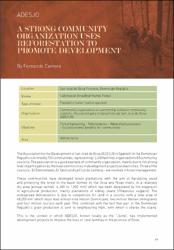/admin/item?itemID=3e332ce6-250b-4a64-8a6b-23a0a03ede4b
ADESJO : A strong community organization uses reforestation to promote development

View/
Type of Access
OpenMaterial Type
Book (chapter)Type of Content
Technical reportSubject
Recursos naturales - República DominicanaRecursos forestales
Comunidades rurales
Reforestación
Language
EnglishCollection
- Gestión ambiental [2910]
Metadata
Show full item record| Abstract: | The Association for the Development of San José de Ocoa (ADESJO, in Spanish), in the Dominican Republic, is composed of 152 communities, representing 12,450 families organized into 83 community councils. The association serves as a strong example of community organization, largely due to the high level of local participation in development projects and activities. Three of these councils—El Derrumbado, El Tatón, and La Cruz de Santana—are involved in forest management. These communities have established forest plantations aimed at both harvesting wood and protecting the forests within the Ocoa and Nizao river basins. This area, characterized by low annual rainfall (600 to 1,000 mm), has been heavily degraded by the expansion of agriculture, particularly kidney bean (Phaseolus vulgaris) cultivation. The widespread deforestation is driven by land-use competition in a country of just 48,000 km² that must support nearly nine million Dominicans, two million Haitian immigrants, and four million tourists annually. This pressure is further intensified by the fact that part of the Dominican Republic’s grain production is exported to neighboring Haiti, with which it shares the island. |
| Author(s): | Carrera, Fernando
|
| Date: | 2010 |
| Published: | In Casaza, J., & Sabogal, C. (comp.), Standing tall: Exemplary cases of sustainable forest management in Latin America and the Caribbean, (99-106) |
| Citation: | Carrera, F. (2010). ADESJO: A strong community organization uses reforestation to promote development. In Casaza, J., & Sabogal, C. (comp.), Standing tall: Exemplary cases of sustainable forest management in Latin America and the Caribbean, (99-106). Rome: Food and Agriculture Organization of the United Nations (FAO). Recuperado de: |
| URI: | https://bvearmb.do/handle/123456789/6308
|

